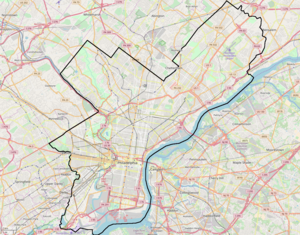33rd Street station (SEPTA)
 Platforms at 33rd Street | |||||||||||||||||||||||||||
| Location | 33rd and Market Streets, Philadelphia, Pennsylvania | ||||||||||||||||||||||||||
| Coordinates | 39°57′20″N 75°11′22″W / 39.955498°N 75.189334°WCoordinates: 39°57′20″N 75°11′22″W / 39.955498°N 75.189334°W | ||||||||||||||||||||||||||
| Owned by | SEPTA | ||||||||||||||||||||||||||
| Platforms | 2 side platforms | ||||||||||||||||||||||||||
| Tracks | 2 | ||||||||||||||||||||||||||
| Connections | SEPTA City Bus: 30, 31, 49, LUCY | ||||||||||||||||||||||||||
| Construction | |||||||||||||||||||||||||||
| Structure type | Underground | ||||||||||||||||||||||||||
| History | |||||||||||||||||||||||||||
| Opened | November 1955[1] | ||||||||||||||||||||||||||
| Electrified | Overhead lines | ||||||||||||||||||||||||||
| Services | |||||||||||||||||||||||||||
| |||||||||||||||||||||||||||
| Location | |||||||||||||||||||||||||||
 33rd Street Location within Philadelphia | |||||||||||||||||||||||||||
33rd Street station is a subway station in Philadelphia. It is located on the campus of Drexel University and serves all routes of the SEPTA subway–surface trolley lines.[2] It is the last station of the subway–surface lines with all lines before the Route 10 splits away and exits the tunnel at 36th Street.[3] The stop is located on the campus of Drexel University.[4]
History[]

The station was opened in November 1955 by the Philadelphia Transportation Company (PTC) as part of a larger project to move portions of the elevated Market Street Line and surface trolleys underground.[1] The original project to bury the elevated tracks between 23rd to 46th streets was announced by the PTC's predecessor, the Philadelphia Rapid Transit Company, in the 1920s, but was delayed due to the Great Depression and World War II.[5] The PTC's revised project also included a new subway–surface tunnel for subway–surface trolleys underneath the campus of the University of Pennsylvania, continuing from the original western portal at 23rd and Market streets to new portals at 36th and Ludlow streets for Route 10 and 40th Street and Baltimore Avenue for other routes.[5]
On April 11, 1988, a trolley derailed at the station, injuring 27 people.[6]
Station layout[]
The station has two low-level side platforms, each capable of platforming two trolleys at a time. Fares are collected manually on board trolleys.
| G | Street level | Entrance/exit, buses |
| M | Mezzanine | Connection between platforms |
| P Platform level |
Side platform | |
| Westbound | ← Route 10 toward 63rd & Malvern (36th Street Portal) ← Routes 11, 13, 34, 36 toward West Philadelphia (36th Street) | |
| Eastbound | Routes 10, 11, 13, 34, 36 toward 13th Street (30th Street) → | |
| Side platform | ||
References[]
- ^ a b Puckett, John L. and Mark Frazier Lloyd. Becoming Penn: The Pragmatic American University, 1950-2000, p. 35, at Google Books, accessed May 31, 2020.
- ^ Williams, Gerry (1998). Trains, Trolleys & Transit: A Guide to Philadelphia Area Rail Transit. Piscataway, New Jersey: Railpace Company. ISBN 978-0-9621541-7-1.
- ^ Springirth, Kenneth C. (2016). Philadelphia Electrified Rail Lines In Color. Scotch Plains, New Jersey: Morning Sun Books Inc. ISBN 978-1-5824-8498-3.
- ^ "University City Campus Map". Drexel University. 22 November 2021.
- ^ a b John L. Puckett. "Putting the Market Street Elevated Underground". West Philadelphia Collaborative History. University of Pennsylvania Graduate School of Education. Retrieved June 2, 2020.
- ^ Baker, Paul (April 11, 1988). "Driver, Passenger Still Hospitalized in Crash". Philadelphia Daily News.
External links[]
 Media related to 33rd Street (SEPTA station) at Wikimedia Commons
Media related to 33rd Street (SEPTA station) at Wikimedia Commons- SEPTA – 33rd Street Station (archived)
- Images at NYCSubway.org
- 33rd Street entrance from Google Maps Street View
- SEPTA Subway–Surface Trolley Line stations
- Railway stations in Philadelphia
- Railway stations in Pennsylvania at university and college campuses
- Railway stations located underground in Pennsylvania
